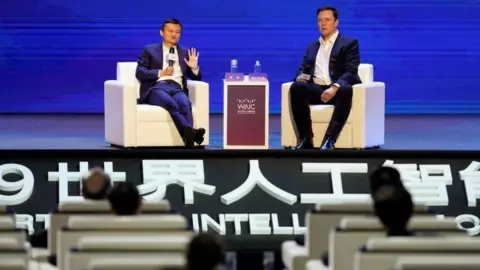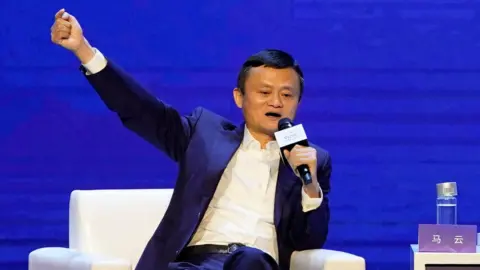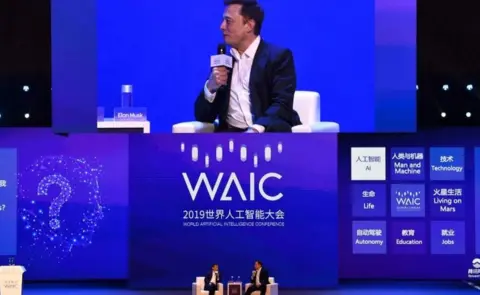Elon Musk and Jack Ma disagree about AI's threat
 Reuters
ReutersAlibaba's Jack Ma and Tesla's Elon Musk took opposing views of the risks and potential rewards of artificial intelligence at an event in Shanghai.
The Chinese entrepreneur said he was "quite optimistic" about AI and thought it was nothing for "street smart" people like them to be scared of.
"I don't know man, that's like famous last words," responded Tesla's chief.
Mr Musk added that technology was evolving faster than our ability to understand it.
The two did, however, agree on one topic: that one of the biggest problems the world is facing is population collapse.
The businessmen are two of the most influential tech leaders shaping the world today.
US-based Mr Musk made his fortune at the digital payments firm PayPal before going on to run electric car-maker Tesla, space rocket company SpaceX and tunnel-transport business The Boring Company among other ventures. He also helped create OpenAI, a San Francisco-based AI research company, although he has since broken ties with it.
Mr Ma co-founded Alibaba, which rivals Amazon for the title of the world's largest e-retailer and is also one of the world's largest cloud computing providers. The group is one of the world's biggest spenders on AI, both within its own business as well as via investments in dozens of third-party companies.
Their 45-minute conversation kicked off the World AI Conference (WAIC), which ties into China's goal of overtaking the US to become the world's leading artificial intelligence innovator by 2030.
Less work
Mr Ma focused much of his comments on how machine learning could act as a force for good. He said it was something "to embrace" and would deliver fresh insights into how people think.
"When human beings understand ourselves better, then we can improve the world better," he explained.
Furthermore, he predicted AI would help create new kinds of jobs, which would require less of our time and be centred on creative tasks.
"I think people should work three days a week, four hours a day," he said.
"In the artificial intelligence period, people can live 120 years.
"At that time we are going to have a lot of jobs which nobody [will] want to do. So, we need artificial intelligence for the robots to take care of the old guys.
"So that's my view about jobs, don't worry about it, we will have jobs."
 Getty Images
Getty ImagesBy contrast, Mr Musk suggested that mass unemployment was a real concern.
"AI will make jobs kind of pointless," he claimed.
"Probably the last job that will remain will be writing AI, and then eventually, the AI will just write its own software."
He added that there was a risk that human civilization could come to an end and ultimately be seen as a staging post for a superior type of life.
"You could sort of think of humanity as a biological boot loader for digital super-intelligence," Mr Musk explained.
"A boot loader is... sort of like the minimal bit of code necessary for a computer to start.
"You couldn't evolve silicon circuits. There needed to be biology to get there."
To avoid such a fate, he said we needed to find a way to connect our brains to computers so that we could "go along for the ride with AI" - something he is trying to achieve via one of his latest start-ups.
Otherwise, he cautioned, AI would become weary of trying to communicate with humans, as we would be much slower thinkers in comparison.
"Human speech to a computer will sound like very slow tonal wheezing, kind of like whale sounds," Mr Musk explained.
"What's our bandwidth? Like a few hundred bits per second, basically, maybe a few kilobits per second, if you're going to be generous.
"Whereas a computer can easily communicate at a terabit level. So, the computer will just get impatient if nothing else. It'll be like talking to a tree - that's humans.
"It will be barely getting any information out."
By contrast, Mr Ma acknowledged that AI could now beat humans at games like chess and Go, but claimed computers would only be one of several intelligent tools that we would develop in time.
"Don't worry about the machines," he said.
"For sure, we should understand one thing: that man can never make another man.
"A computer is a computer. A computer is just a toy.
"Man cannot even make a mosquito. So, we should have a confidence. Computers only have chips, men have the heart. It's the heart where the wisdom comes from."
Although Mr Ma acknowledged that we needed to find ways to become "more creative and constructive", he concluded that "my view is that [a] computer may be clever, but human beings are much smarter".
Mr Musk responded: "Yeah, definitely not.
"It's going to get to the point where [AI] just can completely simulate a person in every way possible, like many people simultaneously," he added.
"In fact, there's a strong argument, we're in the simulation right now."
 Getty Images
Getty ImagesTowards the end of the event the two men came together on one point - that concerns about overpopulation were misguided.
"Assuming... there's a benevolent future with AI, I think that the biggest problem the world will face in 20 years is population collapse," said Mr Musk
"I want to emphasise this, the biggest issue in 20 years will be population collapse, not explosion collapse."
Mr Ma said he was absolutely in agreement.
"One point four billion in China sounds a lot, but I think [over the] next 20 years we'll see this thing bring big trouble to China," he said.
"And the speed of population decreasing is going to speed up. Now you've got a collapse."
However, he suggested, using AI to help people live longer, healthier lives could be part of the solution.
